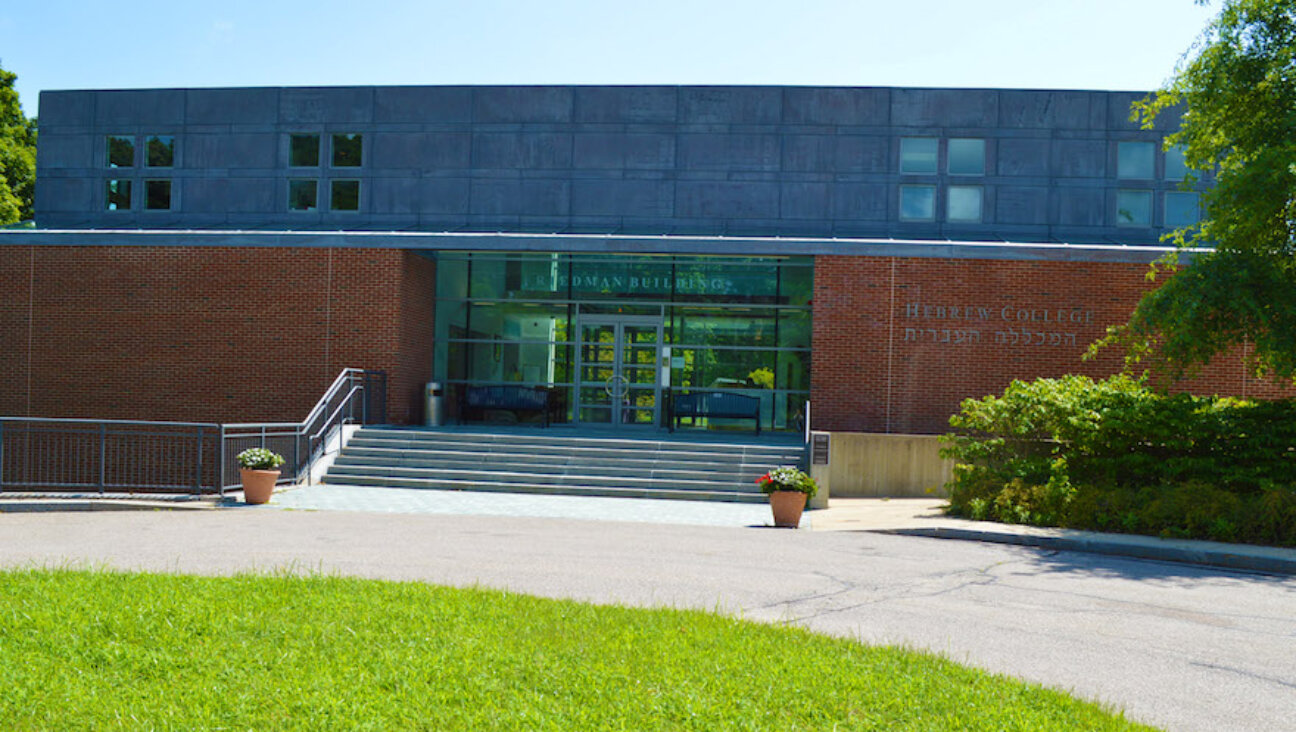February 4, 2005
Call Modern Hebrew By Its Name: ‘Israeli’
In the December 24 On Language column, Philologos criticizes my glottonym “Israeli” as a “denigrating word for modern Hebrew” (“Hebrew vs. Israeli”). But I would argue that “Israeli” is not at all derogatory. It simply acknowledges that the marvelously complex language spoken by Israelis is very different from the Hebrew of the past. Israeli, the world’s youngest language, is mosaic (rather than Mosaic), and it bristles with hybrid vigor.
Philologos has deduced that my theory of the genesis of Israeli is “driven by the agenda of post- (if not anti-) Zionism.” Some Israeli Arabs have attacked my term “Israeli” as Zionist propaganda, because they are both Israeli citizens and native Arabic speakers. I have no political agenda. I am a professional descriptive linguist.
Philologos claims that I underestimate the degree of continuity between classical Hebrew and the language spoken in Israel today. But I do, in fact, acknowledge that Israeli is partially the result of a Hebrew revival. The difference between us is that I recognize another important continuity: that between Israeli and the mother tongue(s) of the founder generation of revivalists (mainly Yiddish).
Philologos also exaggerates the extent of mutual intelligibility between Hebrew and Israeli. Despite 11 years of schooling in the Old Testament, most Israelis still need glosses to understand it. They face difficulties not only with vocabulary, but more importantly, with structures, word order, tenses and aspects.
Much more importantly, even if Israelis understand some Hebrew, that does not mean that Israeli is a direct continuation of Hebrew only. Mutual intelligibility is not crucial in determining the genetic affiliation of a language. After all, few speakers of Modern English understand Chaucer (c. 1343-1400), but no one would claim that his language is genetically unrelated to contemporary English. By contrast, a Spanish-speaker might understand Media Lengua (a mixed language spoken in Ecuador), which consists of Quechua grammar but whose vocabulary is 93% Spanish. Who would argue that Media Lengua is genetically (only) Spanish?
Let us assume for a moment that Hebrew did not die as a spoken language by the second century C.E. It continued to be the mother tongue of generations of Jews who eventually returned to the Land of Israel. From the point of view of mutual intelligibility, their Hebrew could have differed more from biblical Hebrew than does our lovely Israeli. But this is irrelevant to the issue of the origins of Israeli.
The genetic classification of Israeli has preoccupied linguists since the language emerged 100 years ago. As a consequence, Israeli affords insights into the politics not only of language, but also of linguistics. I maintain that the language spoken in Israel today is a hybrid language. Whatever we choose to call it, we should acknowledge, and celebrate, its complexity.
Ghil’ad Zuckermann
Author
“Hebrew as Myth” (Am Oved, 2005)
Zichron Yaacov, Israel
Bans Boost Book Sales
Like Rabbi Nosson Slifkin, I, too, had the distinct honor a few years ago of having my book, “Torah and Science” (KTAV, 1990), banned by various segments of the Orthodox community because they didn’t agree with the gist or tone of the book (“Orthodox Rabbis Launch Book Ban,” January 21).
Some folks who purchased my book returned it to their Orthodox bookstore “with gefilte fish on it,” to quote the salespeople at Eichler’s bookstore in the Boro Park neighborhood of Brooklyn, and applied pressure on the store to discontinue selling it. They got a full refund.
Some Orthodox outlets would not distribute or sell my latest work, “In the Beginning Of” (Jay El Publications, 2004), because “they were made very uncomfortable” by my previous book. Apparently the Orthodox have long memories. Once you are on their hit list, there is no getting off.
So I would advise Slifkin not to try very hard to get back in their good graces. It is highly unlikely to work. Rather, Slifkin should welcome the ban against his books. A ban means that they cannot muster a good counterargument to the book — and bans are good for sales.
Judah Landa
East Brunswick, N.J.
We Must Remember
Opinion writer Elie Wiesel’s appearance in the great United Nations General Assembly auditorium January 24 to commemorate the liberation of Auschwitz said it all (“I Remember,” January 21).
One might have expected a man of his stature to draw a full house. After all, Wiesel is an Auschwitz survivor, a Nobel laureate, an author of great repute and the man called “the conscience of mankind.” But Wiesel spoke to a nearly empty auditorium.
The place was empty because antisemitism is still alive and flourishing throughout the world. The General Assembly is merely a reflection of that. Its empty seats were a reminder of how the lessons of the Holocaust have still been lost on most of the world — on countries with a Muslim majority, on those countries that fear suffering the displeasure of the oil-rich Muslim states, on those countries whose leaders and peoples are just plain antisemites.
So those of us who realize the dangers of unchallenged antisemitism cannot rest on any laurels, cannot complacently point to rusting, crumbling death camps or Holocaust museums to tell the tale sufficiently. As the living witnesses to the Holocaust are increasingly dying off, and as the preservation of the truth of what the Nazis did and the memory of their millions of victims increasingly depends on those who were not even there, we simply cannot sit idly by.
We cannot allow the auditorium to be empty again.
Anthony Miller
Cuernavaca, Mexico
Legion Defends Record
A January 28 article appears to give the impression that the Legionaries of Christ are fascist sympathizers harboring a latent antisemitism (“Controversial Priests Tapped for Jerusalem Center”). The Legion of Christ denounces this impression in the strongest possible terms. In the spirit of Vatican II and Pope John Paul II, the Legionaries of Christ are dedicated to dialogue and collaboration with our Jewish brothers and sisters.
Please consider the facts. Among the legionaries’ most significant institutions is Anahuac University of Mexico City, founded in 1964. In four decades it has grown to serve a student body of 7000, 10% of whom are Jewish. Anahuac University is home to the Yitzhak Rabin Cultural Center and to the Shimon Peres Chair for Peace Studies, and conducts active student and program exchanges with the four leading Israeli universities.
The sources quoted as alleging that the legionaries are fascist sympathizers are men who have made demonstrably false allegations against us and our founder. Documentation demonstrating the falsehood of many of these claims is available online at www.lcfacts.com.
As stewards of the Holy See’s Notre Dame Center of Jerusalem, the Legionaries of Christ are honored to serve the Catholic Church, Israeli society and those who visit Jerusalem. Again, we categorically reject any insinuation that we harbor any shred of antisemitism. We believe our record in this regard speaks for itself.
Father Owen Kearns
Spokesman
Legionaries of Christ
Cheshire, Conn.
Majority Testing Civility
There are Christians who sincerely perceive themselves as victims of misguided church-state separation (“Christmas Holiday Sparks Culture Battle,” December 24, 2004). There are also whites who truly feel victimized by affirmative action and heterosexuals who really think society will implode because of gay marriage. What I fear more today, however, are members of majority groups — be they Christian, white or straight — who begin to sound like bullies, belligerently acting as if it’s okay to impose their beliefs, standards and practices on the entire community simply because they have the numbers to do so.
The aggressive attempts to reintroduce Christian songs in public schools and Christian displays on public property, the fanfare about a Mel Gibson film with an obvious antisemitic slant, preachers suddenly offering public prayers in the name of Jesus Christ before religiously diverse audiences — all these things do not spring out of nowhere. I’m sure there are some genuine spiritual motivations, but I also believe that conservative Christians are feeling empowered by the style, rhetoric and actions of President Bush and his circle.
The decrease in regard for religious pluralism is not far removed from the examples of Bush’s unilateralism in a world where the United States is the sole superpower and his contempt for bipartisanship in an era in which his party controls the three branches of government. Bush does what he wants because he can. Others have called this the “tyranny of the majority.”
Conservative Christians have watched their man in the White House throw his weight around with a swagger. He has told us that during his second term, he will also be spending the political capital he thinks he earned in the election. When the president and his advisers don’t see a need to consult, cooperate and compromise with those who are less powerful, when civility becomes an afterthought, it sends a message about the triumphant rule of the strong.
Jeffrey Stone
Milton, Mass.

I hope you appreciated this article. Before you go, I’d like to ask you to please support the Forward’s award-winning journalism this Passover.
In this age of misinformation, our work is needed like never before. We report on the news that matters most to American Jews, driven by truth, not ideology.
At a time when newsrooms are closing or cutting back, the Forward has removed its paywall. That means for the first time in our 126-year history, Forward journalism is free to everyone, everywhere. With an ongoing war, rising antisemitism, and a flood of disinformation that may affect the upcoming election, we believe that free and open access to Jewish journalism is imperative.
Readers like you make it all possible. Right now, we’re in the middle of our Passover Pledge Drive and we need 500 people to step up and make a gift to sustain our trustworthy, independent journalism.
Make a gift of any size and become a Forward member today. You’ll support our mission to tell the American Jewish story fully and fairly.
— Rachel Fishman Feddersen, Publisher and CEO
Join our mission to tell the Jewish story fully and fairly.
Our Goal: 500 gifts during our Passover Pledge Drive!
























